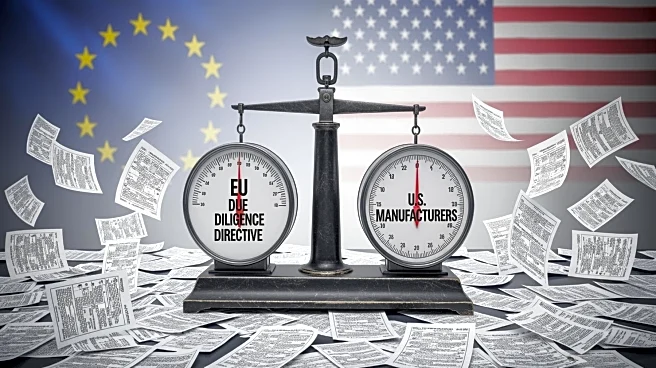What's Happening?
The European Union's Corporate Sustainability Due Diligence Directive (CSDDD) is set to impose extensive due-diligence requirements on U.S. companies with ties to the EU. Approved by the Council of the European Union in 2024,
the directive mandates companies to identify and mitigate social and environmental risks throughout a product's lifecycle, from sourcing to disposal. This regulation applies to U.S. companies with more than 1.5 billion euros in net annual EU turnover, extending its reach deep into supply chains, including small and non-EU businesses. The directive requires member states to incorporate it into national law by July 2027, prompting calls from U.S. and European companies for the European Parliament to scale back its extraterritorial mandate.
Why It's Important?
The CSDDD presents significant operational challenges for U.S. manufacturers, introducing compliance costs and potential bottlenecks in global supply chains. The directive allows EU nations to impose penalties up to 5% of a company's global turnover, increasing legal liability risks. U.S. manufacturers already face substantial regulatory costs domestically, and the CSDDD could exacerbate these burdens, potentially undermining U.S. sovereignty and manufacturing growth. The directive's extraterritorial provisions threaten to disrupt the trading relationship between the U.S. and the EU, highlighting the need for revisions to protect U.S. companies from costly compliance requirements.
What's Next?
President Trump has identified the CSDDD as a threat to U.S.-EU trade relations, with the U.S.-EU framework agreement prioritizing concerns about its impact on American companies. While the EU is considering revisions, key damaging aspects, such as the extraterritorial provision, remain unaddressed. The Legal Affairs Committee of the European Parliament has not removed this provision in its recent compromise legislation. U.S. policymakers are urged to monitor the EU's legislative process closely to safeguard U.S. manufacturers from the directive's burdens.
Beyond the Headlines
The CSDDD's implications extend beyond immediate compliance costs, potentially affecting long-term U.S. manufacturing competitiveness and regulatory autonomy. The directive challenges the Trump administration's efforts on regulatory modernization, a priority for the National Association of Manufacturers (NAM). The NAM advocates for both American and European policymakers to protect U.S. companies from the directive's extraterritorial burdens, emphasizing the need for international cooperation to balance sustainability goals with economic growth.










